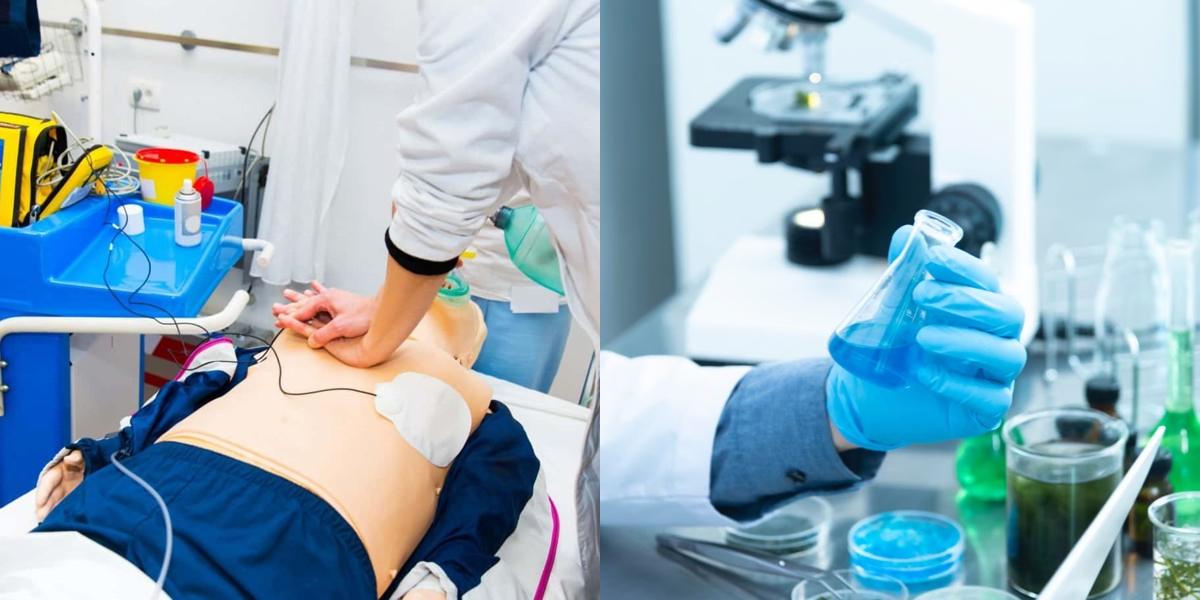ACLS vs. Sterile Processing Technician: Which Healthcare Career is Right for You?

Want personalized recommendations?
Let's match you to the right program

Key Points:
- ACLS (Advanced Cardiac Life Support) providers focus on emergency cardiac care; Sterile Processing Technicians ensure medical equipment is properly cleaned and sterilized.
- ACLS providers typically earn higher salaries, while Sterile Processing Technicians have more entry-level pay.
- ACLS training is primarily in-person, while Sterile Processing Technician training can be online or in-person.
- ACLS training is generally more expensive and takes less time than Sterile Processing Technician training.
In the healthcare industry, every role contributes to patient safety and care. Two rewarding career paths are Advanced Cardiovascular Life Support (ACLS) providers and Sterile Processing Technicians. Let’s dive into the details to help you decide which profession aligns with your goals.
Article continues after recommendations
Recommended for you
What Are ACLS Providers and Sterile Processing Technicians?
ACLS (Advanced Cardiovascular Life Support)
ACLS certification equips healthcare professionals with advanced skills to manage cardiovascular emergencies. From administering life-saving medications to performing CPR and using defibrillators, ACLS providers work in high-stakes environments to stabilize patients in critical conditions.
Sterile Processing Technicians
Sterile Processing Technicians ensure the safety and functionality of medical instruments by cleaning, sterilizing, and maintaining them. These behind-the-scenes professionals play a vital role in infection control within hospitals, surgical centers, and clinics.
Key Differences Between ACLS Providers and Sterile Processing Technicians
1. Job Duties
- ACLS Providers: Focus on immediate patient care during emergencies, such as cardiac arrests or strokes. They must act quickly and effectively under pressure.
- Sterile Processing Technicians: Handle the decontamination, inspection, and preparation of medical tools, ensuring all equipment is sterile and ready for use.
2. Work Environment
- ACLS Providers: Typically found in emergency rooms, hospitals, and ambulances, they thrive in high-energy, patient-facing roles.
- Sterile Processing Technicians: Operate in sterilization departments, often behind the scenes in healthcare facilities.
3. Training Requirements
- ACLS Providers: Advanced training in life-saving techniques, including CPR, medication administration, and EKG interpretation is required.
- Sterile Processing Technicians: Training focuses on sterilization methods, infection control, and medical equipment management, often through vocational programs or on-the-job experience.
ACLS vs. Sterile Processing Technician: Education and Training
ACLS Training
Becoming an ACLS provider involves first completing Basic Life Support (BLS) training. Afterward, candidates enroll in ACLS courses, typically lasting 1-2 days. These courses focus on advanced cardiovascular techniques, including defibrillation, airway management, and medication protocols.
Get courses selected just for you
Try our powerful search engine
Article continues after recommendations
More recommendations for you
Sterile Processing Technician Training
Training for Sterile Processing Technicians is more comprehensive, often requiring several months to complete. Programs cover topics such as infection control, sterilization protocols, and medical terminology. Certification may also be required, depending on the state.
Career Outlook and Salaries
ACLS
The demand for ACLS providers is growing due to an aging population and increasing need for emergency medical services. As of May 2023, EMTs and paramedics, which include many ACLS providers, earn a median annual wage of $46,000.
Sterile Processing Technicians
Sterile processing technicians are essential in maintaining patient safety, which is a priority for healthcare facilities. With a median annual wage of $39,640 as of May 2023, this role offers a stable career path with growth opportunities.
Choosing Between ACLS and Sterile Processing Technician
Which Path Is Right for You?
- Choose ACLS: If you thrive under pressure, enjoy patient-facing roles, and aspire to work in high-stakes emergencies.
- Choose Sterile Processing Technician: If you prefer structured, behind-the-scenes work with a focus on maintaining cleanliness and safety in healthcare environments.
Final Thoughts
Both ACLS providers and Sterile Processing Technicians are indispensable in healthcare. While ACLS professionals focus on life-saving emergency care, Sterile Processing Technicians ensure that critical tools are safe and functional.
Consider your interests, skills, and career goals when making a decision. Whether you’re drawn to the adrenaline of emergency care or the precision of sterilization protocols, there’s a fulfilling career waiting for you.
Learn More
Dreambound simplifies your journey with accessible educational programs tailored to these careers. Explore detailed guides and training options:

Stephanie Dayak is the go-to person for everything related to automation and integrations at Dreambound. As a Certified Tax Technician turned tech whiz, her sharp eye for detail and passion for efficiency become evident in every project she undertakes. When not solving tech puzzles, she's out exploring the local food scene, cozying up with her dogs, or plugged into a thought-provoking podcast. She's an ardent believer in mixing fun with functionality!



